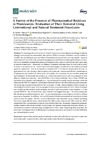Identificador persistente para citar o vincular este elemento:
https://accedacris.ulpgc.es/jspui/handle/10553/72562
| Título: | A survey of the presence of pharmaceutical residues in wastewaters. Evaluation of their removal using conventional and natural treatment procedures | Autores/as: | Guedes-Alonso, Rayco Montesdeoca Esponda, Sarah Pacheco Juárez, Javier Sosa Ferrera, María Zoraida Santana Rodríguez, José Juan |
Clasificación UNESCO: | 2391 Química ambiental 330810 Tecnología de aguas residuales 330811 Control de la contaminación del agua |
Palabras clave: | Wastewaters Pharmaceutical residues Constructed wetlands Conventional wastewater treatments Solid phase extraction, et al. |
Fecha de publicación: | 2020 | Proyectos: | Adaptación al cambio climático en la Macaronesia a través de la reutilización y uso eficiente del agua | Publicación seriada: | Molecules | Resumen: | To encourage the reutilization of treated wastewaters as an adaptation strategy to climate change it is necessary to demonstrate their quality. If this is ensured, reclaimed waters could be a valuable resource that produces very little environmental impact and risks to human health. However, wastewaters are one of the main sources of emerging pollutants that are discharged in the environment. For this, it is essential to assess the presence of these pollutants, especially pharmaceutical compounds, in treated wastewaters. Moreover, the different treatment processes must be evaluated in order to know if conventional and natural treatment technologies are efficient in the removal of these types of compounds. This is an important consideration if the treated wastewaters are used in agricultural activities. Owing to the complexity of wastewater matrixes and the low concentrations of pharmaceutical residues in these types of samples, it is necessary to use sensitive analytical methodologies. In this study, the presence of 11 pharmaceutical compounds were assessed in three different wastewater treatment plants (WWTPs) in Gran Canaria (Spain). Two of these WWTPs use conventional purification technologies and they are located in densely populated areas, while the other studied WWTP is based in constructed wetlands which purify the wastewaters of a rural area. The sampling was performed monthly for two years. A solid phase extraction (SPE) coupled to ultra-high performance liquid chromatography tandem mass spectrometry (UHPLC-MS/MS) method was applied for the analysis of the samples, and the 11 pharmaceuticals were detected in all the studied WWTPs. The concentrations were variable and ranged from ng·L−1 in some compounds like diclofenac or carbamazepine to µg·L−1 in common pharmaceutical compounds such as caffeine, naproxen or ibuprofen. In addition, removal efficiencies in both conventional and natural purification systems were evaluated. Similar removal efficiencies were obtained using different purifying treatments, especially for some pharmaceutical families as stimulants or anti-inflammatories. Other compounds like carbamazepine showed a recalcitrant behavior. Secondary treatments presented similar removal efficiencies in both conventional and natural wastewater treatment plants, but conventional treatments showed slightly higher elimination ratios. Regarding tertiary system, the treatment with highest removal efficiencies was reverse osmosis in comparison with microfiltration and electrodialysis reversal. | URI: | https://accedacris.ulpgc.es/handle/10553/72562 | ISSN: | 1420-3049 | DOI: | 10.3390/molecules25071639 | Fuente: | Molecules [ISSN 1420-3049], v. 25 (7), 1639, (2020) |
| Colección: | Artículos |
Citas SCOPUSTM
34
actualizado el 08-jun-2025
Citas de WEB OF SCIENCETM
Citations
33
actualizado el 15-feb-2026
Visitas
311
actualizado el 15-ene-2026
Descargas
133
actualizado el 15-ene-2026
Google ScholarTM
Verifica
Altmetric
Comparte
Exporta metadatos
Los elementos en ULPGC accedaCRIS están protegidos por derechos de autor con todos los derechos reservados, a menos que se indique lo contrario.
